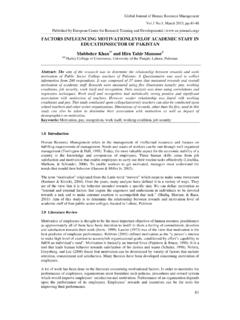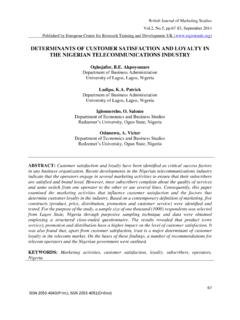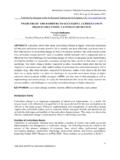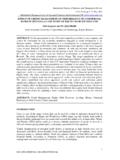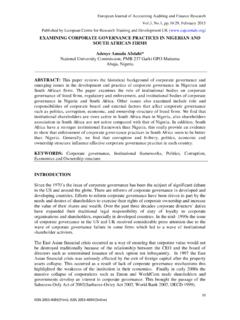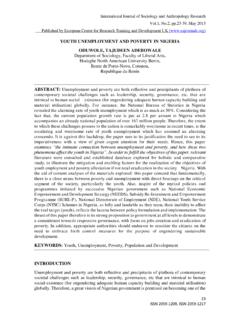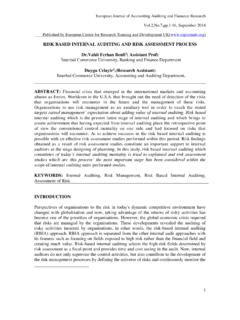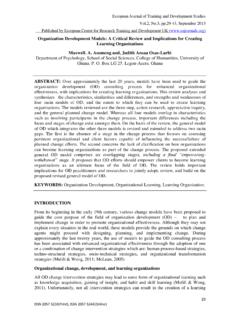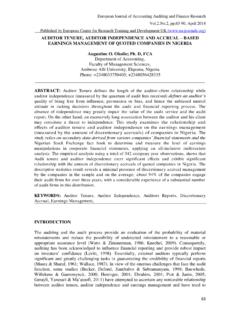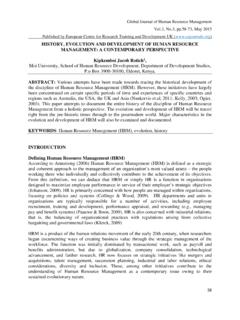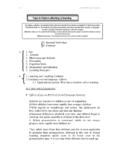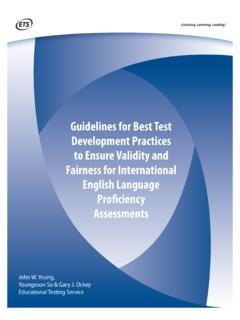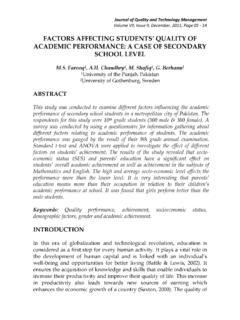Transcription of REVIEW OF FACTORS AFFECTING SECOND LANGUAGE …
1 International Journal of Education, Learning and Development , , , March 2016 ___Published by European Centre for Research Training and Development UK ( ) 26 ISSN 2054-6297(Print), ISSN 2054-6300(Online) REVIEW OF FACTORS AFFECTING SECOND LANGUAGE LEARNING Dr. Hussein A. Al-Daihani1, Ms. Amnah Al-Yaman2 and Mr. Ahmad S. Almutairi2 1 LANGUAGE Center, College of Technological Studies, the Public Authority for Applied Education and Training 2 LANGUAGE Center, College of Business Studies, the Public Authority for Applied Education and Training ABSTRACT: This paper is a REVIEW of the extent socio-psychological FACTORS can affect SECOND LANGUAGE learning.
2 Socio-psychological FACTORS , like motivations, attitude and stereotyping and neurological FACTORS play an important role in the process of learning a SECOND or foreign LANGUAGE . However, scholarly views differ on how much effect these FACTORS have on SECOND LANGUAGE learning. This paper illustrates the different views towards these socio-psychological FACTORS and their neurological correlations. KEYWORDS: SECOND /foreign LANGUAGE learning, motivation, attitude, stereotyping, socio-psychological FACTORS , neurological FACTORS . English can be difficult when taught in a foreign LANGUAGE (FL) setting, where authentic LANGUAGE input may not be readily available outside the classroom.
3 Often, with a character-based LANGUAGE , LANGUAGE learners motivation must be high since persistence and determination are needed to deal with the stress of a difficult LANGUAGE . Motivation represents one of the most appealing, yet complex variables used to explain individual differences in LANGUAGE learning (MacIntyre et al. 2001, p. 462). These words accurately describe the complexity of the concept that researchers, classroom instructors and LANGUAGE learners themselves have faced since Gardner and Lambert brought to light the various aspects of motivation through their studies in the late 1950 s. In the following literature REVIEW of the studies conducted on motivation, the authors will attempt to present a limited overview of motivation, supporting research from both inside and outside of the classroom.
4 Motivation has been broadly recognised by scholars, researchers, and teachers as one of the major variables that determine the level and success of SECOND LANGUAGE learning (SLA). As emphasised by Dornyei (2001), teacher skills in motivating learners should be seen as central to teaching effectiveness (P. 116). Motivated learners are enthusiastic, eager to work hard, concentrate on the tasks given, do not require constant encouragement, willingly confront challenges, and could even motivate others, facilitating collaborative learning. The early attempt to understand the impact of motivation on English LANGUAGE learning stems from the field of social psychology (Gu, 2009).
5 This research paper analyses the impact of motivation on English LANGUAGE learning in terms of the various motivational theories. The motivation of learners greatly affects their willingness to take part in the process of learning. Numerous studies have reported the importance of viewing the concept of motivation as a multifaceted phenomenon. Oxford and Shearin (1994) have examined a number of motivational theories and six variables that influence motivation in LANGUAGE learning (Al-Bustan & Al-Bustan, 2009, S454): International Journal of Education, Learning and Development , , , March 2016 ___Published by European Centre for Research Training and Development UK ( ) 27 ISSN 2054-6297(Print), ISSN 2054-6300(Online) Attitudes ( sentiments towards the target LANGUAGE ).
6 Beliefs about self ( expectations about one s attitudes to succeed, self-efficiency, and anxiety). Goals (perceived clarity and relevance of learning goals as reasons for learning). Involvement ( extent to which the learner actively and consciously participates in the learning process). Environmental support ( extent of teacher and peer support). Personnel attributes ( aptitude, and LANGUAGE learning experience). As argued by Pit Corder, given motivation, it is inevitable that a human being will learn a SECOND LANGUAGE if he is exposed to the LANGUAGE data (Dornyei & Ushioda, 2009, 1). This statement was given four decades ago and, from then on, numerous theroetical perspectives and studies investigating the multifaceted nature of motivation and its impact on SECOND LANGUAGE learning have emerged.
7 At the same time, the world has also witnessed the growth of globalisation, European reconstruction, the demise of communism, extensive economic and political migration, greater mobility, and the rapid development of media technologies all contributing to the relentless pace of global English (McKay, 2002). In other words, over the recent decades the world has transformed dramatically it is currently distinguished by sociocultural and linguistic flexibility and diversity, where LANGUAGE learning, identity, and ethnicity have become multifaceted contemporary subject matters and the focus of considerable attention in the field of sociolinguistic.
8 However, it is only recently that those engaged in the field of SECOND LANGUAGE learning motivation have actually started to investigate what this evolving global phenomena may suggest for how scholars conceptualise the motivation to acquire proficiently in global English as SECOND LANGUAGE for individuals wanting to gain global recognition or identity (Shafaei & Nejati, 2008). In other words, motivation in SECOND LANGUAGE learning is presently in the process of being completely reevaluated and reconstructed within the perspective of current concepts of self and identity. Establishing a successful SECOND LANGUAGE learning process is a challenging undertaking that is subject to numerous external and internal aspects in the societies where it is brought in.
9 Motivation towards acquiring proficiency in English as well as the attitudes of teachers and learners are among the major aspects in the success of bringing in a foreign LANGUAGE in any institution. The attitude and levels of motivation towards English as a SECOND LANGUAGE are modest; not hindering English LANGUAGE learning but also not creating the most excellent environment for English LANGUAGE learning in educational institutions (Klemens, 2009). Educators facilitating English LANGUAGE learning should identify the weaknesses in attitude and motivation among learners then deal with them by developing suitable strategies of English instruction which are motivating and can foster favourable attitudes towards learning English as SECOND LANGUAGE .
10 In the last few years, a great deal of work has been done in the border areas between linguistics and other disciplines relevant to LANGUAGE learning such as sociology, psychology and neurology. In these areas, the main aim for most researchers is to find solutions to the problem of LANGUAGE learning. From a realistic perspective they argue that there is not in theory any limit to the degree of proficiency that may be achieved in a SECOND LANGUAGE , and that, consequently, the traditional distinction between native and non-native in LANGUAGE is a doubtful validity International Journal of Education, Learning and Development , , , March 2016 ___Published by European Centre for Research Training and Development UK ( ) 28 ISSN 2054-6297(Print), ISSN 2054-6300(Online) (Christophersen1973, pp.)
